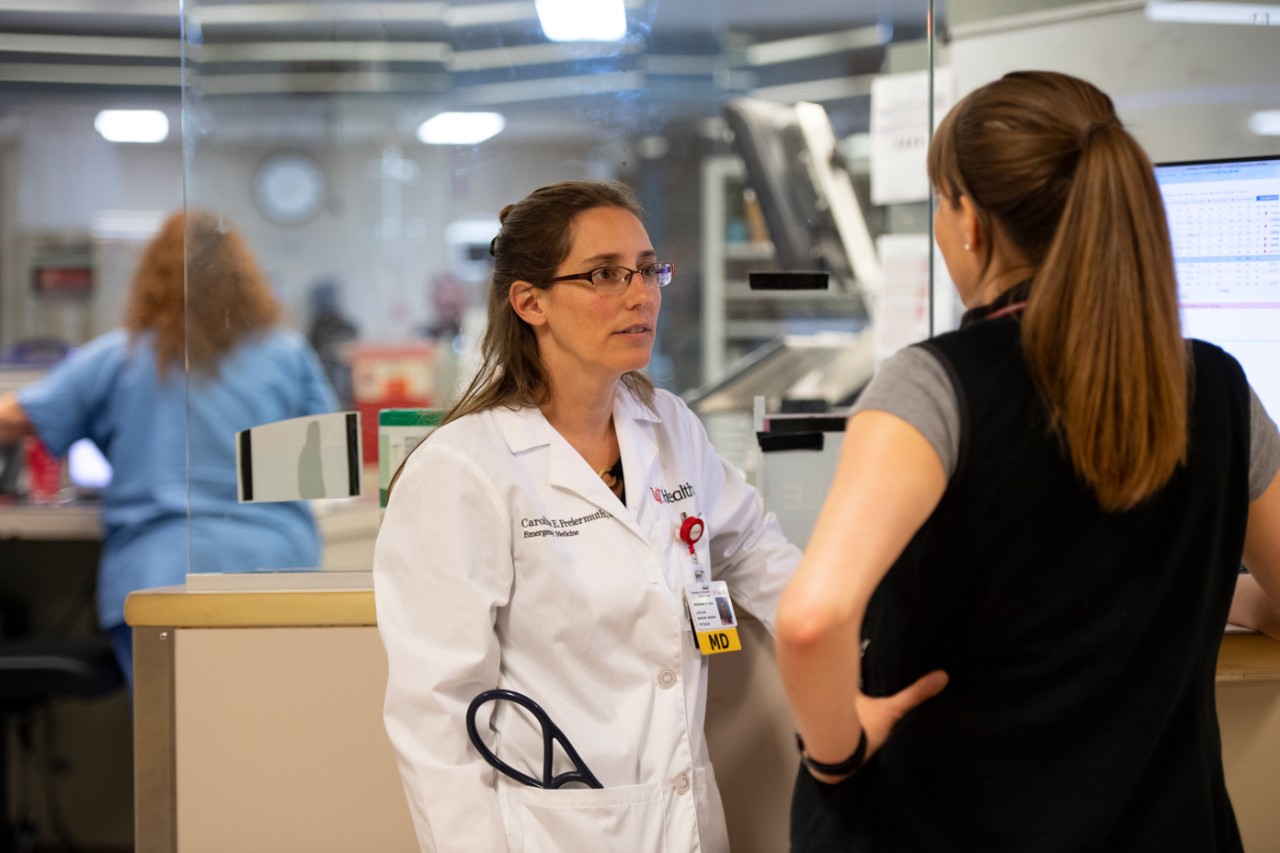
WVXU: Genetics play a role in opioid addiction. A UC doctor is drilling down on the specifics
Research could lead to the creation of a test for opioid use disorder
Since 2014, Ohio is in the top five nationwide in opioid deaths. Recently published research from the University of Cincinnati examines the role of genetics in opioid use disorder. WVXU produced a story on the research, interviewing lead researcher, Caroline Freiermuth, MD, of the Department of Emergency Medicine at the UC College of Medicine. She and her team screened over 1,300 patients at three Ohio urban emergency rooms and found 20% had opioid use disorder.
The patients studied were at the ER for a variety of reasons. Some were already addicted to opioids, some had never taken them, and others were using them to manage acute pain. All of them were asked to be part of the study.
WVXU reported the 20% of people who had opioid use disorder is higher than what was previously thought — 2% in the general population and 7-15% in emergency room settings.
"This is still a hidden disease," Freiermuth says. "People are afraid to talk about it and we really do need to do a better job of screening so that we can identify the people who have already developed this disorder and really get them into the treatment they need."
For genetics, she looked at the dopamine reward pathway and the metabolism of opioids for the study.
Using artificial intelligence, her team is analyzing the entire data set, including things like the environment, mental health disorders, and past experiences to see what role they play.
"The biggest takeaway is this adds to the body of research that says there is really a genetic component," Freiermuth says. "We're starting to hone down what the genetic component is and we could get to a point in the future when we could run tests and if you have opioid use disorder, we could run the test on you and we could run it on your children so that we could counsel people in the future that they may also be at risk."
Read more about the research here.
Lead photo of Caroline Freiermuth, MD/Colleen Kelley/UC Marketing + Brand
Next Lives Here
The University of Cincinnati is classified as a Research 1 institution by the Carnegie Commission and is ranked in the National Science Foundation's Top-35 public research universities. UC's graduate students and faculty investigate problems and innovate solutions with real-world impact. Next Lives Here.
Related Stories
Mural by UC grad honors U.S. military history
July 17, 2024
Local 12 highlighted a new mural by University of Cincinnati graduate and artist Brandon Hawkins that pays tribute to U.S. military history.
Social media fuels extreme political rhetoric
July 17, 2024
UC College of Arts and Sciences Professor Jeffrey Blevins tells Local 12 that online algorithms fuel political polarization on social media.
Camp aims to empower children, teens who stutter
July 17, 2024
A one-week, evidence-based program for children and teens who stutter at the University of Cincinnati will teach kids to communicate effectively, advocate for themselves and develop confidence about their communication abilities. Camp Dream. Speak. Live., which is coming to Cincinnati for the first time July 22-26, began in 2014 at the University of Texas at Austin. The Arthur M. Blank Center for Stuttering Education and Research at UT expects to serve more than 2,000 children at camps across the United States, Africa, Asia and Europe this year.
UC archivist explores Troy’s invisible workers
July 17, 2024
UC Classics archivist Jeff Kramer examined the unheralded and largely uncredited role laborers played in the 1930s excavation at Troy in Turkey.
From intern to full-time: Recent Lighting Design grad joins Bandit Lites
July 16, 2024
Lighting & Sound America spotlights recent graduate Riley Rowan's new position at Bandit Lites, a full-service design, management and producer of live events and entertainment.
CCM alum Donald Lawrence to be inducted into Cincinnati Black Music Walk of Fame
July 16, 2024
UC College-Conservatory of Music alumnus Donald Lawrence is part of the 2024 class of Cincinnati Black Music Walk of Fame inductees. Located at the Banks in downtown Cincinnati, the induction ceremony on July 27 will feature a parade of stars and a free concert by the Zapp Band.
U.S. stroke survival is improving, but race still plays role
July 16, 2024
U.S. News & World Report, HealthDay and Real Health covered new research from the University of Cincinnati that found overall rates of long-term survival following stroke are improving, but Black individuals experience worse long-term outcomes compared to white individuals.
Presidential challenge to UC: Join Ride Cincinnati to fight cancer
July 16, 2024
UC President Neville Pinto has again challenged every UC college and unit to send at least one rider to the September 14 Ride Cincinnati event to help fundraise for cancer research and cancer care. UC students ride free. Signup by July 31 for free UC-branded cycling jersey.
Pediatric ICU rates linked to housing quality, income, education
July 16, 2024
Healio highlighted research led by the University of Cincinnati and Cincinnati Children's Hospital's Carlie Myers that found a link between pediatric ICU admission rates and housing quality, household income and education.
UC study: Long-term stroke survival improving, but racial disparities remain
July 15, 2024
New research from the University of Cincinnati published in the journal Neurology found long-term survival rates following acute ischemic strokes are improving, but Black individuals experience worse long-term outcomes compared to white individuals.
